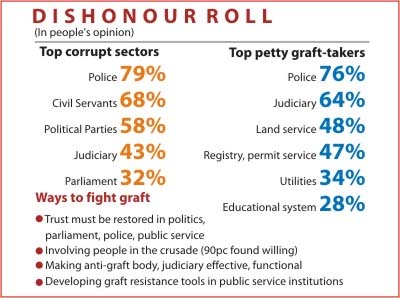Finds TIB in its maiden public opinion polls; Bangladeshis keep faith most in govt for fight against graft
The police are the most corrupt institution followed by the civil service, political party and the judiciary in Bangladesh, shows the first public opinion survey of Transparency International Bangladesh (TIB).
Global Corruption Barometer 2010, the biggest worldwide survey on people’s perception and experience about corruption, said most Bangladeshi respondents favour the government over other organisations to fight corruption.
The corruption watchdog released the survey at a press conference at the Brac Centre Inn yesterday. It is the first time Bangladesh has been included in the yearly survey initiated in 2003 covering 44 countries.
Of the 86 countries surveyed, Bangladesh has the highest number of citizens to prefer the government to fight corruption with 60 percent of them opting for it against a global percentage of 22, says the survey of 1,049 Bangladeshis in 64 districts between June 9 and 10 this year.
The media is the second choice of Bangladeshi respondents for fighting corruption with 16 percent of them giving opinion in its favour. However, the highest number of respondents (25 percent) worldwide picked the media as the most trusted institution to fight corruption.
The survey also came up with an interesting finding that 90 percent of Bangladeshi respondents want to be involved in fighting corruption while 95 percent of them are eager to help their colleagues or friends in the same cause. Ninety-three percent of them believe ordinary people can make a difference in combating corruption.
 According to the survey, nongovernmental organisations in Bangladesh are more corrupt than the media and the military. Sixteen percent of the respondents chose it followed by the media (14 percent) and military (nine percent).
According to the survey, nongovernmental organisations in Bangladesh are more corrupt than the media and the military. Sixteen percent of the respondents chose it followed by the media (14 percent) and military (nine percent).
Seventy-nine percent of Bangladeshis, surveyed in the report, believe the police are the most corrupt public service institution followed by the public service (68 percent), political party (58 percent), the judiciary (43 percent) and parliament (32 percent).
Bangladesh also tops the list with regard to victims of petty corruption in key public service sectors, says the survey report published worldwide yesterday.
The survey took into account people’s opinions on corruption and their experience about it.
Ten Sub-Saharan African countries are doing better than Bangladesh in combating petty corruption, shows the survey with opinions of more than 91,500 people across the globe.
According to the findings, bribe has plagued key public service institutions in Bangladesh with 76 percent of the respondents labelling police as the key bribe collector. Sixty-four percent of them awarded the judiciary the second position followed by the land service (48 percent), registry and permit service (47 percent), utilities (34 percent), educational system (28 percent) and medical service (18 percent).
Petty bribery in public service institutions is higher in Bangladesh than other South Asian Countries such as Afghanistan, Pakistan and India, shows the survey.
The reasons people give bribes include receiving the service they are entitled to, speeding things up and avoiding trouble with the authorities.
“The people of Bangladesh have more faith in the government than any other institution to fight corruption. The government must ensure transparency in its basic democratic institutions and strengthen them to resist corruption,” said TIB Executive Director Dr Iftekharuzzaman.
He also stressed the need for making effective the Anti-Corruption Commission and the judiciary to curb corruption.
According to the survey, 66 percent respondents believe corruption has increased globally over the past three years.
Eighty percent of the respondents worldwide labelled political party as the most corrupt institution followed by parliament (61 percent), police (59 percent) and religious bodies (53 percent).
TIB Trustee Prof Muzaffer Ahmad and TIB president M Hafizuddin Khan were present at the press conference.
Global Corruption Barometer is one of the four tools the institution uses to measure corruption worldwide. The others are Corruption Perceptions Index (CPI), Global Corruption Report and Bribe Payers Index.
According to the CPI published on October 26, Bangladesh remains static in terms of curbing corruption.




















